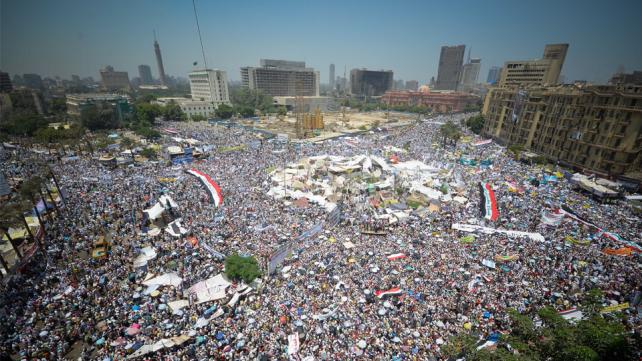
In journalism, they say news is when man bites dog, not when dog bites man. In other words, it is the focus on the unusual and the bizarre that takes precedence. That principle was clearly at play earlier this month when mobs tortured and celebrated the murder of Libya’s former ruler Muammar Ghaddafi, while elsewhere in the Arab world, Tunisia quietly held its first fair and free democratic elections in a smooth transition to legitimate, representative government. It is the first country to do so since the beginning of the Arab spring this year.
Congratulations to Tunisia for sticking to the right principles and not succumbing to mob violence and vigilante justice, as was the case in Libya, despite enduring its share of torture, reprisals, and bloodshed. It is commendable that the rule of law was respected at a grassroots level, not through coercion or guns. Tunisia has turned out to be the best model so far, even more so than the Afghanistan, whose rules and civil society continue to be dictated by occupying forces.
But this initial bright start can take a dangerous turn if there is not a recognition of the challenges ahead. We cannot forget that Tunisia is also emerging from the darkness of dictatorship into democracy that represents the aspirations of its majority Muslim population. Tunisia, if done right, can become a template for other Arab nations seeking to rebuild.
Establish the Rule of Law:
One of the first challenges the Arab Spring faces is to establish the rule of law. The presence of arms, especially in Libya, will allow different groups to turn against each other, continuing the chaos which has killed 30,000 and injured 50,000 people already, according to the Libyan government. Availability of arms will keep a violent option open to those who become impatient with the pace of the new society being rebuilt, or those who seek to divide Arabs, instead of unite them. Both Iraq and Afghanistan are clear examples of this. The absence of justice has been the main complaint in almost all societies where the Arab Spring has taken root. It must flower into a spring based on the rule of law where justice is accessible to all.
Rights of Minorities and Immigrants:
The torture and killing of Black African workers and residents of Libya under the new Libyan regime is nothing short of a war crime. The Arab Spring has not been easy for its minorities, whether it is these Africans, Pakistani or Bangladeshi immigrants in Bahrain, or Copts in Egypt.
The Egyptian masses and Syrian opposition have been particular in making serious efforts to build a working relationship across sectarian and ethnic divisions.
The new leaders, Arab intellectuals, and civil society have a responsibility to speak out in favor of minority rights. This will defuse the strategies normally pursued by the fading regimes to divide and rule. A number of observers have noted that the spate of attacks against Coptic Christians in Egypt seemed to be engineered by the military, probably trying to send the message that Egyptians cannot peacefully co-exist without its iron hand to maintain law and order.
Dialogue with the Secular Elite:
The human touch is miraculous. People who talk to each other, see eye to eye with each other on difficult issues. The key is dialogue, and a firm commitment to respect the life, freedom, and other rights of these communities. Discussing and negotiating are hallmarks of a healthy society.
Since it is likely that, just like Tunisia, some shade of Islamic political parties will win elections sooner or later, these parties need to enter into communication with the secularists, who have, since most Arab countries attained independence from colonial power about half a century ago, been in charge of running their countries and military. This displaced secular elite has money, connections, and are experienced in power games. For secularists, a palpable feeling of disempowerment may lead them to seek to overthrow any government they smell an inkling of Islam from, as Algeria in 1991 and Turkey over the years, has shown.
The new government and secularists need to be in conversation with each other, with a guarantee that no one’s rights will be violated. For inspiration, we need to remember how South Africa‘s Nelson Mandela successfully engaged with the white majority in the aftermath of his election. Instead of dismissing them, he worked with them.
Tunisia’s Islamic leadership has already taken these steps by initiating talks with secularists.
Muslim populations in the Islamic world have mostly seen their secular leaders as agents of Western colonial power and by proxy, despised the West. It might come as a great unexpected relief to the West that Muslims, through their electoral processes, start seeing their rulers as their people instead of agents of colonial powers.
Dealing with the Sharia Demand
While all public opinion surveys point out that Egyptians, Tunisians, and other Muslims demand Sharia, the West shivers nervously hearing any talk of Sharia. The fact of the matter is that even the Afghan and Iraqi constitutions, written by the occupying American powers, pay homage to Sharia.
When Muslim societies demand Sharia, they mean easy access to justice, fairness, and respect for the rights of all people.
It is now the burden of Muslim leaders of the Arab Spring to articulate the way Prophet Muhammad, peace and blessings be upon him, expressed and implemented Sharia. When he established his peace sanctuary in Madinah, he developed a constitution to which all people including Pagans (Mushriks) and Jews were full partners in society. They even had a right to have their own laws, their own courts, and full freedom to practice their religion. He said together with Muslims, they constituted “one nation.” This constitution called Sahifa and Wasiqa in Arabic, was a set of treaties which he negotiated among all groups.
Islamic forces or parties across the board (I will refrain from using the term “Islamists”, a loaded word that has been used and abused) have a special responsibility, as the Prophet did, to declare their commitment to upholding the dignity and freedom of not just the majority Muslim population, but every member of minority communities.
There is a great deal of discussion in Islamic literature about the purpose of Sharia (Maqasid). We find scholars ranging from Imam al-Ghazali to Imam Ibn Taimiyyah participating in this great conversation. Imam al-Ghazali articulates that the purpose of Sharia is to preserve five matters:
- faith
- life
- wealth
- intellect
- family
Interestingly enough, this development occurred six centuries before John Locke's articulation of a similar approach to law in England. Ibn Taimiyya, Imam Shatebi, and many others have built on the Quran and Sunnah in their conversation about the purpose of Sharia.
We pray that new Muslim democracies will keep the purpose of Sharia in mind along with the fact that God sent all Prophets to help people stand up to establish justice (Quran 57:25).
Photo Attribution: http://commons.wikimedia.org/wiki/File:Tahrir_Square_on_July_29_2011.jpg








Add new comment